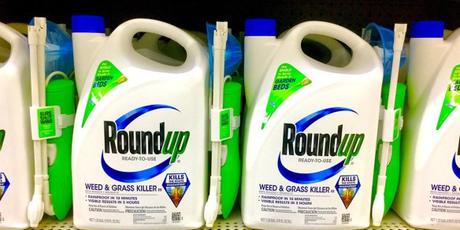GR: Here’s an example of a common industry ploy to discredit science using paid researchers. Monsanto knows Roundup causes cancer and endangers wildlife, but they don’t care. They use any means possible to continue selling their dangerous products. The tobacco industry tried and eventually failed to do this. The fossil-fuel industry has been doing this for more than 40 years.
Herbicides seem to offer a final solution for the human war on weeds. However, we shouldn’t be using using poisons to control weeds; we should be using mechanical techniques, biological controls, and better weed management strategies.

“The decision was a major blow to Monsanto as its most popular product, Roundup, is glyphosate-based. Following the IARC’s decision, the European Union began to consider banning the product altogether, potentially depriving Monsanto of a significant stream of revenue. Monsanto, which is seeking the EU’s renewal of the chemical’s license for the next 10 years, is now also fighting a high-profile court case attempting to bring IARC’s 2015 decision—as well as the agency itself—under scrutiny.
“Central to Monsanto’s case is its argument that the IARC failed to consider two studies that found glyphosate to be safe. The first was conducted by the German-based Federal Institute for Risk Assessment (BfR), which concluded in 2015 that “glyphosate is unlikely to pose a carcinogenic risk to humans.” The second is a study from “independent” German scientist Helmut Greim, who conducted a meta-analysis and found that “glyphosate’s carcinogenic potential is extremely low or non-existent.”
“Monsanto has claimed that IARC’s lack of consideration for these two studies proved that the agency’s findings were an “outlier” in linking glyphosate exposure to cancer. Their failure to include these two studies, according to Monsanto’s vice president of strategy, Scott Partridge, shows that the IARC “was corrupted apparently with individuals who have an agenda” and warrants an external investigation into the workings of the agency and its leadership.
“Partridge told Politico in an interview that “When an organization such as IARC is given authority, with that comes a responsibility … to be objective, transparent, thorough and fair. IARC has violated each and every one of those responsibilities and that should be troubling to anyone who is interested in preserving sound science.”
“Though Monsanto’s reasoning may be considered sound be some, there is clear evidence that the studies that form the base of Monsanto’s legal argument are hardly “sound science” themselves. The first study conducted by BfR, for instance, in drawing conclusions contrary to those of the IARC, relied heavily on unpublished papers provided to its authors by the Glyphosate Task Force—an industry lobbying group, working to relicense the herbicide in the EU, whose website is run by Monsanto UK.
“The meta-analysis conducted by Helmut Greim is little different. According to the declaration of interest found within the study, all of Greim’s co-authors are employed by either the Glyphosate Task Force or Monsanto. Greim himself was funded by Monsanto “as an independent consultant for his expert contributions to this manuscript.” Other work by Greim, including one entirely funded by Monsanto, lists him as having previously served as an independent consultant for Monsanto and for the Glyphosate Task Force.” –MintPress News (Continue reading: Monsanto Calls for Investigation Into WHO Agency for Ignoring Monsanto-Funded Studies.)

